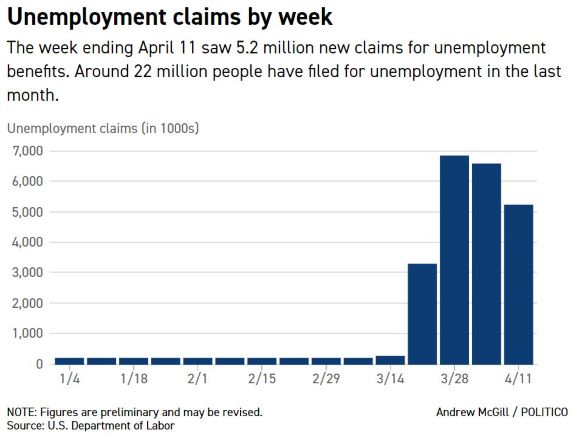When we first heard about the novel coronavirus, very few would have guessed the impact it would have on the entire world. It was impossible to know that it would make its way across the globe to the United States. Since then, millions of Americans have lost work while even more have had to make difficult transitions to the virtual world.
Between March 14 and April 16, 22 million Americans filed for unemployment. That is more than one in every ten workers in the United States. Of those 20.5 million jobs have no guarantee of coming back. These numbers are staggering.

Every business was affected in some way. Supply chains were interrupted and some organizations closed permanently. For business leaders, the question of managing its workforce has provided a real test. This has been true in my own experience. Along with being a Graduate Assistant for the Center for Business Ethics, I am the Office Manager for a local dog walking company. At first, my company did not worry much about the virus. Our walkers do not come in direct contact with many people. We changed a few protocols to make sure they washed hands more often and didn’t share leashes or equipment. It was all going well until one of our walkers came in contact with a COVID-positive client. Although the client did not initially tell us he was home being tested, four days later he notified our company.
Emergencies and crises call for ethical leadership. One of our walkers had been exposed and could have transferred the disease to other households on her route. How should we, as a small business and friend of many of the clients, respond? We knew we needed to take decisive action to keep our walkers and clients safe.
We immediately notified the walker and instructed her on how to get tested. We took her off the schedule and contacted the other households on that route. Two days later, in mid-March, Governor Inslee issued the “Stay Home, Stay Healthy” order. That night the company's owner furloughed all workers and told us to “get in the system before things got worse.” She tasked me to help each walker successfully apply for unemployment and make sure that they would not be left in the dark. At first, I thought she was only concerned about her business, but I quickly realized she had her employees' best interest at heart. They were on the first wave of the unemployment rush. She moved quickly and decisively to get them the help they needed. Since then she has regularly checked in with the walkers and their well-being.
This has all gone as well as can be expected. Together, she and I changed protocols to keep our walkers safe while they were able to work. Once Governor Inslee gave the order, the owner worked swiftly to take care of her business and her employees. She openly and quickly communicated information as it came and made sure her employees knew she cared.
 Din Tai Fung is another positive example of a company treating employees fairly while protecting the business. Jeffery Smith, the director of the Center for Business Ethics, met virtually with David Wasielewski, a Seattle University MBA alumnus and managing partner at Din Tai Fung. He explained that although initially they had to close two of the four Seattle locations, all four are now back up and running for take-out and delivery options. Mr. Wasielewski has always been clear that people are what make Din Tai Fung so special. Even though they had to initially furlough many people, they still took care of employees as best they could, providing health benefits for workers and their families. Just like the small dog walking company, Mr. Wasielewski knew that communication and swift action were important to make his business's response transparent and fair to the employees.
Din Tai Fung is another positive example of a company treating employees fairly while protecting the business. Jeffery Smith, the director of the Center for Business Ethics, met virtually with David Wasielewski, a Seattle University MBA alumnus and managing partner at Din Tai Fung. He explained that although initially they had to close two of the four Seattle locations, all four are now back up and running for take-out and delivery options. Mr. Wasielewski has always been clear that people are what make Din Tai Fung so special. Even though they had to initially furlough many people, they still took care of employees as best they could, providing health benefits for workers and their families. Just like the small dog walking company, Mr. Wasielewski knew that communication and swift action were important to make his business's response transparent and fair to the employees.
Ethical leadership is tested most during times of crisis. Is there open and honest communication? Are courageous, decisive steps taken? Are people taken care of even when times are rough? Difficult choices will inevitably be made. But if leaders remember to respect their closest stakeholders - if companies can take care of their employees and customers - we will make it through to the other side of this pandemic.
